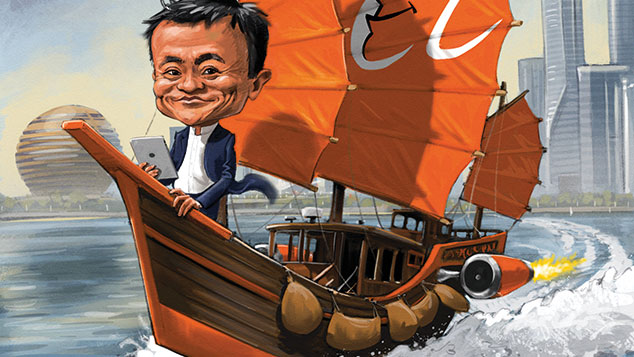All hands on tech! China’s giants set sail for the wider world
Firms such as Alibaba and Tencent already dominate ecommerce in China – now they’re expanding their reach. Investors should back them – at least for now, says Rupert Foster.

Get the latest financial news, insights and expert analysis from our award-winning MoneyWeek team, to help you understand what really matters when it comes to your finances.
You are now subscribed
Your newsletter sign-up was successful
Want to add more newsletters?

Twice daily
MoneyWeek
Get the latest financial news, insights and expert analysis from our award-winning MoneyWeek team, to help you understand what really matters when it comes to your finances.

Four times a week
Look After My Bills
Sign up to our free money-saving newsletter, filled with the latest news and expert advice to help you find the best tips and deals for managing your bills. Start saving today!

Firms such as Alibaba and Tencent already dominate ecommerce in China now they're expanding their reach. Investors should back them at least for now, says Rupert Foster.
There's a race on to be the world's first trillion-dollar listed business (notwithstanding this week's setback in the markets). And for now, it looks as though China's big companies are taking a drubbing from their US rivals. Apple tops the leaderboard at $812bn, Google (Alphabet) is in second place on $735bn, and retail behemoth Amazon ranks third on $691bn. The two leading Chinese internet businesses, Alibaba and Tencent, are further behind at $469bn and $503bn, and Baidu, the third of the Chinese giants, is not even in the same ball park at a mere $78bn. However, since the beginning of 2017 the two larger Chinese players have risen much more rapidly than their US peers Tencent is up 133%, while Alibaba is up 112%. By comparison, Amazon the best of the Americans by some distance is up 90%, but Google has seen much slower share-price appreciation, up only 39%. What is it about the big Chinese tech groups that has captured global investors' imaginations?
Understanding China's internet giants
Tencent started out as an online gaming firm, but is now best known as the home of QQ and Weixin (which is known as WeChat in the West). These are China's largest social-media and messaging apps. Together they hold the interest of more than 800 million Chinese inhabitants for more than an hour a day. Like US social-media giant Facebook (which is banned from China), Tencent is starting to use its services' omnipotence in the Chinese social-media market to encourage its users to consume all sorts of other services while they peruse their messages. For example, Tencent is already the largest player in streaming TV in China with more than 300 million users (by contrast, US and UK equivalent Netflix has around 100 million).
MoneyWeek
Subscribe to MoneyWeek today and get your first six magazine issues absolutely FREE

Sign up to Money Morning
Don't miss the latest investment and personal finances news, market analysis, plus money-saving tips with our free twice-daily newsletter
Don't miss the latest investment and personal finances news, market analysis, plus money-saving tips with our free twice-daily newsletter
In keeping with its heritage, Tencent still makes 40% of its revenue from games. The group remains the dominant player in mobile and PC games in China, and continues to benefit from the boom in smartphone gaming. However, it's worth remembering that Tencent's social-media business despite its dominance is still very young and has a long way to go. Facebook currently makes around $85 of advertising revenue out of every US user in a year. Tencent makes a mere $9.50 a year from its Chinese users. This gap will narrow as China gets richer, and as advertising densities in China increase.
Alibaba is probably the most famous of the Chinese internet companies. The firm's core business is ecommerce. It has two websites, Taobao and Tmall. These are essentially eBay and Amazon combined, as they cater for both amateur and professional buyers and sellers. Taobao and Tmall combined enjoy an extraordinary 70% market share of all ecommerce transactions in China. The company does no retailing itself, but simply provides the marketplace the model is similar to an online shopping centre.
By contrast, Alibaba's main competitor, JD.com, initially adopted the online department-store model whereby the company takes inventory risk, but can curate the products on the site in line with demand from customers. However, JD is now fast converting as is Amazon, in fact to the online shopping-centre operator model, which allows for much faster growth. Indeed, Alibaba's growth has accelerated over the last 12 months. As ecommerce penetration rises to account for more than 15% of the total retail market, it appears to be gaining ground even more rapidly as consumers are starting to find that the utility benefits of ecommerce are applicable to a much wider range of purchases.
Alibaba saw the equivalent of $750bn of merchandise traded on its two main websites in 2017, but even at that size its main Amazon-equivalent website, Tmall, saw 43% growth in traded goods in the last quarter. Alibaba now has 515 million active users comprising around 54% of the adult (but internet literate) Chinese population. However, penetration in smaller cities and towns is still low and in rural areas online penetration is still only sitting at 15%. Also, like Amazon, Alibaba is currently expanding into fresh food. Making inroads into this new area should eventually allow ecommerce to grow to 30% of the overall market.
Bricks, not just clicks
Alibaba has also been a leader in "omni-channel" retailing (that is, selling through physical branches as well). In the last two years, Alibaba has spent around $10bn buying up large offline retailers in China, or at least purchasing stakes in them. The company has also launched its own offline supermarket chain and its own offline convenience-store chain. It's easier for Alibaba to expand in this way than it is for Amazon. That's partly due to Alibaba's relative size in the online market, but even more important is the relatively low quality of the offline competition in China.
This is a key point of difference between China and the West, and one that's easy to forget. Shopping in the "real world" in China has never been like wandering down Bond Street or going window shopping in a Westfield shopping centre. The absence of high-quality offline retailers with strong brands means that all Chinese internet companies may have a far easier job disrupting the market than their developed-world rivals. So we can expect Alibaba's offline acquisition spree to continue and not just in China.
A better target for expansion
Indeed, 2018 is the year that the Chinese ecommerce players go West. They have been raising billions of dollars to provide a war chest for their likely acquisition and promotional drive. Alibaba's main competitor, JD.com, counts US retail giant Walmart as its second-largest shareholder and is thus being encouraged to have global ambitions. JD.com has publicly stated it will attempt to "break" the US and Europe in the next two to three years.
Is this really the best use of their time and money? It's true that both of the Chinese ecommerce giants have massive scale and accumulated expertise. However, in the online world you need aggression to succeed particularly if you are a late arrival in a market. JD.com is better placed than Alibaba to make a go of it, as it may well be able to use Walmart's offline network to aid the logistical side of its business. However, the key to success lies in how many billions JD.com is willing to spend on attempting to pull customers away from Amazon and offline retailers. Indeed, in many ways the developed world is the last place these companies should be aiming to expand. There are strong legacy brand retailers to overcome and strong distrust of Chinese businesses, particularly in the US.
The good news for their investors is that Alibaba, Tencent and JD.com understand this and they have all committed billions of dollars to a more fertile hunting ground emerging Asia. There are nearly two billion consumers in southern Asia and GDP growth rates in India, Indonesia, the Philippines and Vietnam are among the highest in the world. Importantly, as with China, there are a limited number of quality legacy retailers in these countries and anti-Chinese sentiment is moribund. Alibaba and Tencent already own the top two ecommerce companies in southeast Asia, Lazada and Shopee and they look to get a significant lead.
India, however, may well prove to be the pot of gold at the end of the rainbow for all global ecommerce players. It's the only market where all the big players are going head-to-head, and no one has a noticeable advantage. They all understand that dominance is the key to long-term profitability and, with the carrot of 1.3 billion consumers, it appears likely that the global players have only just started spending in their aim to conquer the market.
Meet your new bankers
Alibaba, Tencent and JD.com are also all very focused on an entirely different industry finance. In a country where all the banks are government-controlled and payments systems were archaic, the internet companies have become most citizens' preferred financial partners. Alibaba's Alipay has brought safe and easy non-cash payment systems to China, and with the advent of e-wallets it has also circumvented the banking sector. Most Alibaba customers have an Alipay account in which they hold funds. And if they have any spare cash, they can push it into Alipay's giant cash-management account, Yu'eBao (now around $250bn in size), or into any other financial product that Alibaba or its partners might offer.
China's point of difference here is the success of e-wallets. PayPal was originally meant to be an e-wallet company, but now it is really just a credit-card processor. In developed markets nearly all ecommerce payments are made with a credit or debit card in the US, these can incur costs of up to 4%. By contrast, Alipay's e-wallet fees are around 0.6%. In the UK, we lead the world in bank transfer penetration (which is cheaper), but this requires the knowing and entering of individual sort codes and bank-account details. In China, it just takes one click and the payments are made via Alipay.
The ease and low fees have lead to widespread adoption of e-wallets in China but this has had two downsides. Firstly, Alibaba wasn't making much money out of it. Secondly, the government-owned banks complained to the government of their likely demise if this continued, highlighting one big risk for disruptors in China you have to tread carefully when disrupting a government-controlled sector. So Alibaba and Tencent have dialled back their growth in areas where they are taking on the banks. Instead, they are looking at the key thing small consumers need in order to become big consumers credit.
Lending money to Chinese consumers
Consumer-credit provision is a nascent business in China. Until 2009 few Chinese used a mortgage to buy a house, and even fewer borrowed to pay for consumer goods. This is starting to change, but consumer debt per head is still less than a tenth that of the typical developed-world country. And since consumer credit is a new business, the legacy banks have no idea how to provide it or how to price and control it. There may be credit ratings for the top 10% of society, but everyone else is under the radar.
All of the ecommerce companies have in-house credit-rating systems that give them a dramatic advantage in pricing credit. However, the Chinese government is much more aggressive and hands-on in managing consumer credit. It doesn't want a developed-world problem to arise. In the last three months the government has got rid of thousands of pay-day lenders and back-room credit lenders, which means China is seeing a nasty credit crunch right now among the less affluent. However, this looks set to end by Easter and the large players left behind after the crunch will benefit from a credit-starved populace. Alibaba and Tencent are the main players here. There are also several second-tier firms with particular specialisations. These companies listed at the end of last year and have seen collapsing share prices, but they should enjoy a clear road to success within a few months. These include Qudian, PPDai and LexinFintech.
A play on Chinese private equity
Alibaba and Tencent are the largest private-equity investors in China and the range of their investments is breathtaking from films to healthcare, ride-hailing and logistics. The two companies have gained such dominance across the majority of the key internet sectors that there is little chance of them being challenged. It may seem counterintuitive of the Chinese government to allow two firms to become so dominant remember these two buisnesses are each controlled by just one man Jack Ma for Alibaba and Pony Ma for Tencent. However, it appears likely that this situation is ideal for the Chinese authoritarian government. If the government has any issue with vast swathes of the Chinese economy, it can make just two phone calls to get the problem sorted. Alibaba and Tencent know all too well that they must play the game. Both provide vast quantities of data to the central government to allow it to keep an eye on its citizens with greater ease.
In addition, one of President Xi Jinping's key geopolitical aims is to project a Chinese image onto the world and to challenge US hegemony wherever it can be found. In the business world that hegemony is most viscerally represented by the likes of Google, Facebook and Amazon. China needs its own behemoths to challenge these companies so Alibaba and Tencent must be protected and encouraged as global battle ensues over the next few years. Once global domination is assured then the government may become more vocal about how these businesses are run. This gives current minority shareholders of these standard bearers at least a few years yet to benefit from the government's largesse in allowing them to run rampant.
Get the latest financial news, insights and expert analysis from our award-winning MoneyWeek team, to help you understand what really matters when it comes to your finances.
Rupert is an investment strategist and adviser at J & C Foster, providing Asian, Consumer and Global Equities Strategy advice to a number of family offices and portfolio management organisations. He writes on Asia and Global Macroeconomics for a number of investment publications including MoneyWeek and HL Investment Times.
-
 Average UK house price reaches £300,000 for first time, Halifax says
Average UK house price reaches £300,000 for first time, Halifax saysWhile the average house price has topped £300k, regional disparities still remain, Halifax finds.
-
 Barings Emerging Europe trust bounces back from Russia woes
Barings Emerging Europe trust bounces back from Russia woesBarings Emerging Europe trust has added the Middle East and Africa to its mandate, delivering a strong recovery, says Max King
-
 Invest in space: the final frontier for investors
Invest in space: the final frontier for investorsCover Story Matthew Partridge takes a look at how to invest in space, and explores the top stocks to buy to build exposure to this rapidly expanding sector.
-
 Invest in Brazil as the country gets set for growth
Invest in Brazil as the country gets set for growthCover Story It’s time to invest in Brazil as the economic powerhouse looks set to profit from the two key trends of the next 20 years: the global energy transition and population growth, says James McKeigue.
-
 5 of the world’s best stocks
5 of the world’s best stocksCover Story Here are five of the world’s best stocks according to Rupert Hargreaves. He believes all of these businesses have unique advantages that will help them grow.
-
 The best British tech stocks from a thriving sector
The best British tech stocks from a thriving sectorCover Story Move over, Silicon Valley. Over the past two decades the UK has become one of the main global hubs for tech start-ups. Matthew Partridge explains why, and highlights the most promising investments.
-
 Could gold be the basis for a new global currency?
Could gold be the basis for a new global currency?Cover Story Gold has always been the most reliable form of money. Now collaboration between China and Russia could lead to a new gold-backed means of exchange – giving prices a big boost, says Dominic Frisby
-
 How to invest in videogames – a Great British success story
How to invest in videogames – a Great British success storyCover Story The pandemic gave the videogame sector a big boost, and that strong growth will endure. Bruce Packard provides an overview of the global outlook and assesses the four key UK-listed gaming firms.
-
 How to invest in smart factories as the “fourth industrial revolution” arrives
How to invest in smart factories as the “fourth industrial revolution” arrivesCover Story Exciting new technologies and trends are coming together to change the face of manufacturing. Matthew Partridge looks at the companies that will drive the fourth industrial revolution.
-
 Why now is a good time to buy diamond miners
Why now is a good time to buy diamond minersCover Story Demand for the gems is set to outstrip supply, making it a good time to buy miners, says David J. Stevenson.
